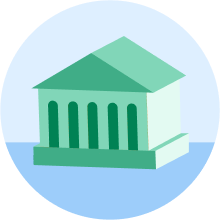A closer look at the best business loans for women
Best for: Established businesses
With an SBA 7(a) loan, women business owners have access to low interest rates and long repayment terms, plus the versatility to use the funds for working capital, supplies, inventory, equipment, real estate and other purchases. And because of the SBA guarantee, lenders can often relax their qualification requirements, which makes it easier to qualify for these loans.
Qualifications:
-
For-profit U.S. business.
-
Unable to access credit on reasonable terms from nongovernment sources.
-
Financial qualifications determined by individual lender.
Bank of America Business Advantage Unsecured Term Loan
Best for: Bank business loans
How it benefits women entrepreneurs: For women business owners who don’t have the ability or prefer not to put down a security deposit for a loan, the Business Advantage unsecured term loan offers a lump sum of capital for a variety of business needs. Additionally, Bank of America offers several resources through its Center for Business Empowerment, including a free educational program through a collaboration with Cornell University and a database of various funding sources available to women entrepreneurs.
For established businesses with solid revenue and excellent credit scores, a traditional lender like Bank of America can typically offer the best interest rates and terms.
Qualifications:
Fora Financial – Online term loan
Best for: Bad credit
How it benefits women entrepreneurs: Fora Financial’s minimum credit score requirement is one of the lowest available for online term loans, and it doesn’t require collateral. It therefore provides a valuable funding opportunity for women entrepreneurs who have less-than-ideal credit scores and who prefer not to secure a loan with physical collateral. Fora is also unique among many of its competitors for offering discounts for early payments (some lenders, particularly banks, actually penalize you for this).
Qualifications:
-
In business for at least six months.
-
At least $20,000 per month in revenue.
-
No open bankruptcies or dismissed bankruptcies within the past year.
Some online lenders are willing to work with businesses with bad credit, especially if they have strong finances. Fora Financial, for example, only requires a minimum credit score of 570, and you may be able to work with Fundbox with a 600 credit score.
How it benefits women entrepreneurs: Fundbox is friendly to women who have recently started their businesses due to its low annual revenue and time in operation requirements. Women entrepreneurs may also appreciate the Minority Owned Business section of its online resource center, which includes a wealth of blog posts and guides designed to support and uplift women and minority business owners.
Qualifications:
Accion Opportunity Fund – Small Business Working Capital Loan
Best for: Minority women
Qualifications:
Female business owners in historically underserved communities can access funding from SBA lenders, nonprofit organizations and specialty programs — and may have more success with these options than applying for traditional business loans.
Many nonprofit lenders also offer microloans and other forms of business financing for women- and minority-owned businesses in their communities outside of the SBA loan program.
Qualifications:
-
Be a U.S. business.
-
Show your ability to repay the loan.
-
Personal guarantee and collateral likely required.
-
Specific financial qualifications determined by individual lender.
Huntington National Bank – Lift Local Business Program
Best for: Women veterans
Qualifications:
-
No bankruptcies in the last 4 years.
-
Requirements for credit score, time in business and business revenue not disclosed.
Business loans offered by banks and credit unions, as well as SBA loans may be a good fit for women veteran entrepreneurs.
The upfront guarantee fee for SBA Express loans (loan amounts up to $500,000) is waived for a veteran or the spouse of a veteran. And the SBA’s Military Reservist Economic Injury Disaster Loan (MREIDL) program can be used to cover regular business operating costs when you have an essential employee who is called up to active duty as a military reservist.
National Funding – Equipment Financing
Best for: Equipment loans
How it benefits women entrepreneurs: National Funding’s equipment loans are startup-friendly and don’t require a high credit score. Because the equipment purchased is typically used to secure the loan, additional physical collateral is not required. Like Fora, National Funding offers prepayment discounts, which can help reduce the overall cost of the loan.
Qualifications:
What is a small-business loan for women?
Loan products specifically and solely designed for women business owners exist on the market in very limited form. This is because the Federal Equal Credit Opportunity Act makes it illegal for lenders to discriminate against applicants based on their gender (and other protected factors). Some institutions, such as Grameen America, operate as a “special purpose credit program” under this act in order to legally target a specific group of applicants — in this case, women.
Many lenders, however, do offer loans with more flexible and reasonable qualification requirements, which helps to extend funding opportunities to a wider pool of business owner applicants — including women.
Additionally, a number of lenders offer resources such as mentorship and coaching programs, online courses and searchable lists of grants and alternative funding opportunities for underserved entrepreneurial communities.
Types of small-business loans for women
SBA loans
🤓 Nerdy Tip
Utilizing the free resources offered by the SBA-affiliated agencies and nonprofit organizations, many of which are specifically designed for women business owners, can help you prepare a business plan, navigate the loan application process and secure funding.
Bank business loans
Huntington National Bank, with branches in 11 states, is one bank that offers a loan program targeted to women as well as veteran and minority business owners. Its Lift Local Business loan program features lower fees and credit score requirements, plus longer repayment terms.
Online loans
Microloans
Microloans can be a good option if you can’t qualify with a bank or online lender or have a small financing requirement.
How to get a business loan for women
1. Decide which loan type is right for you
With many options available to you, you’ll first want to understand the different types of business loans (see explanations of each above) and decide which option best suits your needs.
2. Check that you meet minimum qualification requirements
Qualification requirements vary by loan type and lender, so once you’ve decided which type of business loan is the right fit for you, you’ll want to check that you meet the minimums in these three key areas:
-
Credit score. Lenders will be asking for your personal credit score, which you can get from your credit report via the main credit bureaus. (You can also get it from NerdWallet.)
-
Time in business. Most online lenders will require a minimum of six months in business, while most banks will prefer at least two years.
-
Annual revenue. A few lenders will require only $50,000 in annual revenue, while most will look for $100,000 to $250,000.
3. Determine how much you need (and how much you can afford)
This is where you’ll need to get clear on exactly why you require funding and just how much you need. You’ll need to do some calculations at this stage to be sure that your cash flow and bottom line can support monthly loan payments — which will include interest.
Use our calculator below to help you estimate the anticipated cost of your loan.
Estimate payments to understand the cost of a business loan
Over the course of the loan, expect to pay
$0.00/mo
Payment breakdown
$0.00
Get personalized small-business loan rates to compare
with Fundera by NerdWallet
4. Find the right lender for you
Different lenders offer certain types of loans — some, for example, specialize in only equipment financing or business lines of credit while others offer a variety of loan types. Each lender will have its own set of requirements to qualify for a loan, and each will have both positive and negative factors to weigh when you’re considering your loan options.
Compare Lender Types
The graphic below may serve as a quick resource for you to understand your options and figure out which type of lender is a good fit for you.

BankTerm loans, business lines of credit, SBA loans and equipment loans. Longer terms and competitive rates but strict qualifications.

SBAMicroloans, disaster loans, working capital loans and business lines of credit. Lower rates, longer terms and larger amounts but strict qualifications and slow to fund.

Online lenderTerm loans, business lines of credit and equipment loans. Fast approval and funding and flexible qualifications but higher rates and shorter terms.

MicrolenderMicroloans. Flexible qualifications and friendly to startups but smaller amounts and slow to fund.
5. Prepare your materials and apply
Your business loan application process will be more efficient and less stressful if you gather all of the required documentation ahead of time. Precise requirements will vary by loan and lender, but generally, you will need the following documents to apply for a small-business loan:
-
A valid form of identification (such as a driver’s license).
-
Business plan.
-
Bank statements and tax returns (both business and personal).
-
Business financial documents like a balance sheet and P&L.
-
Business legal documents like licenses, permits and contracts.
-
Proof of collateral, if relevant.
The process for applying will also depend on the lender. Many banks will require you to apply in person or over the phone, while online lenders will have you complete the application entirely online.
6. Review your loan agreement
Once you’ve been approved for a small-business loan, you’ll need to sign an agreement to finalize the loan and receive the funds. It’s important to carefully and thoroughly review the loan agreement before you sign. Be sure to address any questions or concerns you may have with the lender before signing.
Other resources for female entrepreneurs
Government and nonprofit organizations offer free assistance to women entrepreneurs. These programs may provide women with help completing steps to getting a small-business loan, like writing a business plan, and guidance on topics like starting a business, financial management and marketing.
How to get certified as a women-owned business
Getting certified as a women-owned business can help your business grow by boosting your reputation and helping you find and be recognized for various programs and lending opportunities. Since there is no universal certification, how you get certified will depend on your type of business and where you are located. Follow these steps to start your certification process.
1. Make sure you qualify
Even though different agencies might have different qualifications, some common requirements are as follows:
-
Your business is at least 51% owned by a woman who is a U.S. citizen.
-
In addition to ownership, your daily business operations are managed by a woman.
-
Your business is a for-profit business.
Different agencies may verify this information using different methods, like sworn affidavits or site visits to your business.
2. Find a certification agency
You can become certified through the federal government or a private agency, depending on your type of business.
In addition to the federal government, local business administrations may provide special certifications for their state, and the qualifications may be more lenient than national initiatives.
Certification as service-disabled veteran-owned small businesses (SDVOSBs) is also offered. This certification allows you to compete for contracts across federal agencies and is not limited to just the Department of Veterans Affairs.
3. Organize your documents
Although it varies, most agencies have similar requirements, so it’s prudent to be organized going into the process. These documents may include:
-
Business certification and registration paperwork.
-
Proof of good standing with your secretary of state.
-
Business licenses.
-
Owner resumes.
-
Brief history of business.
-
Proof of citizenship of owners.
-
Business financial documents.
Alternative funding options for women-owned businesses
If you aren’t able to qualify for a business loan, here are some additional options that may allow you to secure funding for you business:
-
Grants for women-owned businesses. Women-owned businesses can get free funding through small-business grants from private companies and nonprofit organizations. Here are places to look for small-business grants for women. Grants can be highly competitive, but if you do receive funding, that money may help you start or expand your business.
-
Business credit cards. Business credit cards also offer financing for women-owned small businesses that are starting out or need working capital. Qualification can be easier than for a business loan because approval generally relies more heavily on personal credit history instead of business credit score and revenue.
-
Equity financing for women-owned businesses. Equity financing can include angel investors, venture capitalists and crowdfunding. Although women-owned businesses can face the same obstacles with equity financing as they may with other types of funding, there are programs and companies that target female entrepreneurs, including startup businesses. IFundWomen and 37 Angels, for example, are companies that offer crowdfunding platforms as well as resources for women entrepreneurs to learn and connect with one another.
-
Bootstrapping. If you’re having trouble qualifying for funding, you may want to consider bootstrapping where you rely on your own personal resources to start or expand your business. Unlike equity financing, you’ll be able to retain full control of your business. However, you may be putting personal assets at risk, as is the case when you pull money out of a retirement account to use for your business.
Read the full article here

